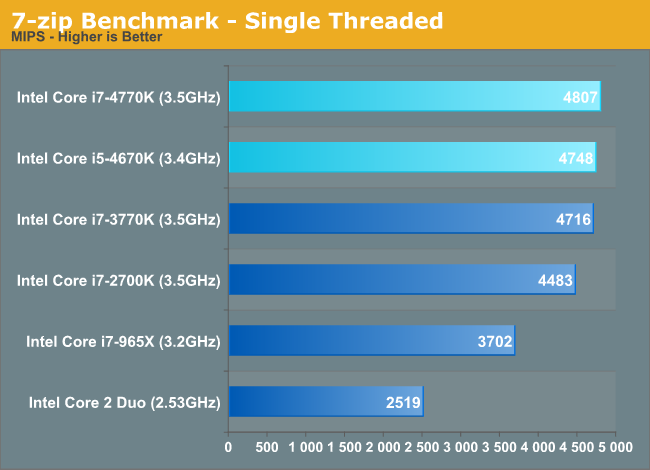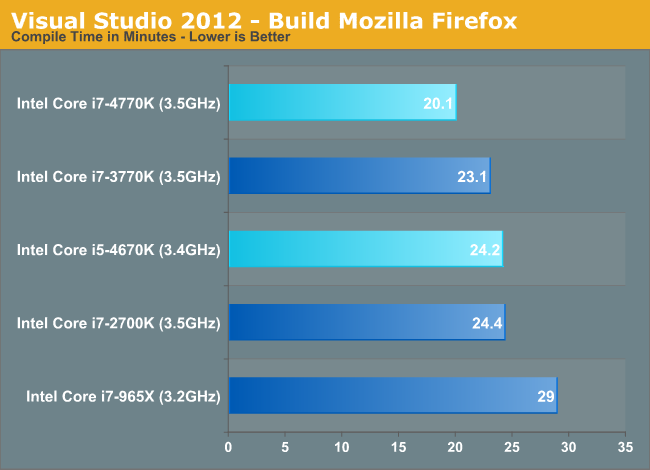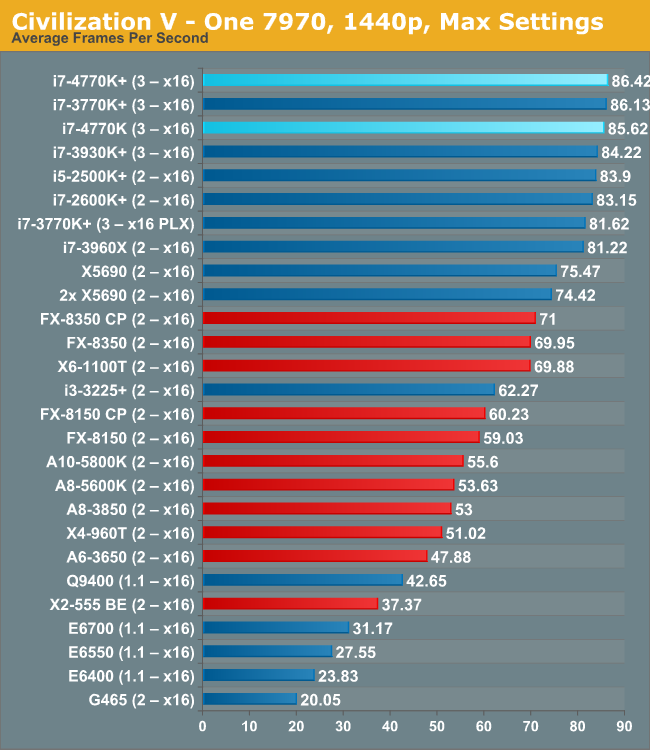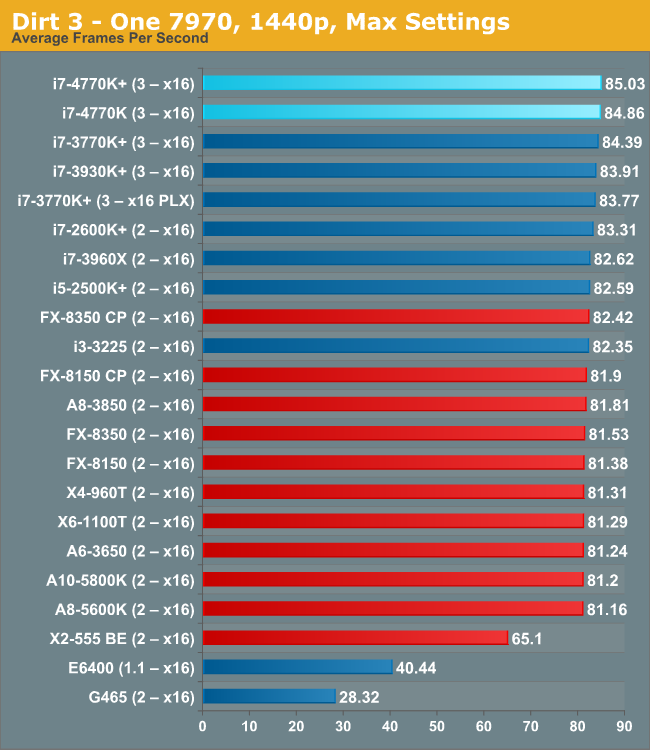The Haswell Review: Intel Core i7-4770K & i5-4670K Tested
by Anand Lal Shimpi on June 1, 2013 10:00 AM ESTCPU Performance: Five Generations of Intel CPUs Compared
For the purposes of our look at Haswell, we will be breaking up our review coverage into two parts. The rest of this article will focus on the CPU side of Haswell, while coverage of the GPU - including Iris Pro and Crystalwell - has been spun off into another artice: Intel Iris Pro 5200 Graphics Review: Core i7-4950HQ Tested.
The majority of the market doesn’t upgrade annually, so I went back a total of five generations to characterize Haswell’s CPU performance. Everything from a 2.53GHz Core 2 Duo through Nehalem, Sandy Bridge, Ivy Bridge and Haswell are represented here. With the exception of the Core 2 platform, everything else is running at or near the peak launch frequency for the chip.
In general, I saw performance gains over Ivy Bridge of 1 - 19%, with an average improvement of 8.3%. Some of the performance gains were actually quite impressive. The 7.8% increase in Kraken shows there’s still room for improvement in lightly threaded performance, while the double digit FP performance gains in POV-Ray and x264 HD really play to Haswell’s strengths.
Compared to Sandy Bridge, Haswell looks even more impressive. The Core i7-4770K outperforms the i7-2700K by 7 - 26%, with an average performance advantage of 17%. The gains over Sandy Bridge aren’t large enough to make upgrading from a Sandy Bridge i7 to a Haswell i5 worthwhile though, as you still give up a lot if you go from 8 to 4 threads on a quad-core part running heavily threaded workloads.
Compared to Nehalem the gains average almost 44%.











Quite possibly the most surprising was just how consistent (and large) the performance improvements were in our Visual Studio 2012 compile test. With a 15% increase in performance vs. Ivy Bridge at the same frequencies, what we’re looking at here is the perfect example of Haswell’s IPC increases manifesting in a real-world benchmark.
Gaming Performance
After spending far too much time on the Iris Pro test system, I didn’t have a ton of time left over to do a lot of gaming performance testing with Haswell. Luckily Ian had his gaming performance test data already in the engine, so I borrowed a couple of graphs.
As expected, Haswell is incrementally quicker in GPU bound gaming scenarios compared to Ivy Bridge - and most definitely at the top of the charts.












210 Comments
View All Comments
Nacho - Saturday, June 1, 2013 - link
Maybe it's time to upgrade my C2D E4300? :Pkrumme - Saturday, June 1, 2013 - link
Absolutely, go get a good ssd and this processor or IB, if its for desktop.Oscarcharliezulu - Monday, June 3, 2013 - link
Do it.Boissez - Saturday, June 1, 2013 - link
So my 2½ year old 2600K ($317) performs about the same as todays 4560K ($242). Color me underwhelmed.Meanwhile in mobileland we've went from 1 Ghz Tegra 2 to 2 Ghz Snapdragon S600 within the same timespan.
tential - Saturday, June 1, 2013 - link
Because for 99.9% of the population what's out there today is more than fast enough. Hell, the Core2Duo Conroe/Penryn processors are fast enough for most people today. I'm still using one in fact.On the mobile side however, we have tons of applications that could use more power. My galaxy S3 takes a little to load up some games, and while the data may have been downloaded to the phone through wifi, it still isn't on my screen yet.
I think it's pretty obvious why you see mobile land having to progress so fast while desktop processors are focusing on power consumption as the AVERAGE consumer (not people who are techies) would prefer smaller PCs and pushing more power efficient processors into smaller and smaller things like the intel NUC is what the consumer desires.
In short:
Your desires are the 1%. The 99% are being catered to.
klmccaughey - Monday, June 3, 2013 - link
@tential: Your last statement, maybe it should read "OUR desires are the 1%"? ;) I bet we would all be clapping right now if the 4770k was a big upgrade. Well, most of us, I think?jeffkibuule - Saturday, June 1, 2013 - link
Mobile is having the same performance renaissance that desktop chips had from 2004-2006 when we went from a hot, bloated Pentium 4 to a cool, efficient Core 2 Duo. And certainly we've had performance gains since then, but eventually the gains won't come so easily. You can start to see that a bit now with how the Exynos 5250 in the Nexus 10 is thermally throttled to 4W such that CPU and GPU can't be both running full tilt at the same time.Homeles - Saturday, June 1, 2013 - link
You're disappointed because your understanding of physics and Moore's Law is poorly developed. The scenario you've provided is a blatant false equivalency.According to your desperate desires, the roughly 4GHz processors that launched with Sandy Bridge should be running at twice the clock speed today.
When you understand that leakage power grows exponentially as transistor geometries shrink, and that power consumption raises exponentially as clock speed rises, you will realize that even the 10% gains that Haswell makes here are a big deal.
Dal Makhani - Saturday, June 1, 2013 - link
Homeles, I really appreciate your well said comment, im taking a business degree with an accounting major, but ive always loved building PC's as a hobby. When some of my computer science/engineer friends try to show me the stuff they are learning, i am baffled as its not my area of expertise. I can only imagine how challenging it is to combat the shrinking processes and make performance gains as you said. I have deep respect for Intel and AMD, always trying to utilize their research and engineers to try and make any gains for society. These forum people are just so ignorant sometimes and it baffles me.chizow - Saturday, June 1, 2013 - link
Hey, similar path as me. :) Don't worry about lack of understanding now, stick to it, keep reading great technical sites like AT, keep an open mind, and you'll get a really good grip on the industry, especially if you are an actual user/enthusiast of the products.